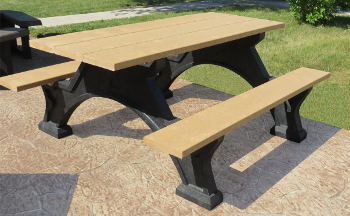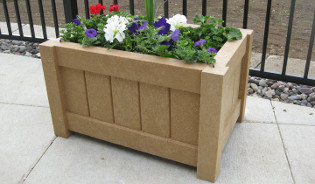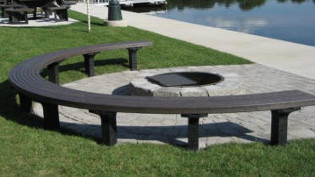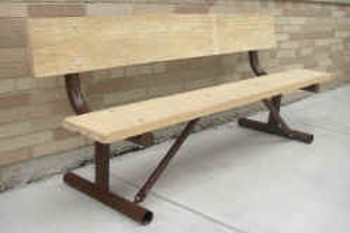Recycled Plastic
You may think the best reason to recycle plastic is to reuse it and save our resources or maybe to keep the landfills from overflowing. Maybe you already know that just producing bottled water for the USA uses about 17 million barrels of oil per year and creates over 2.5 million tons of CO2 each year and a lot of this would be saved if this plastic was recycled. While these are all important reasons to recycle, there are even more important reasons than what you may see at first glance.
We Are Dependent on Plastic
Since the 1950s, plastic use has grown to mammoth proportions. New production of plastic products now exceed 300 million tons per year. Plastic has replaced several other types of materials because it is relatively inexpensive to produce and is easy to form. Plastic is also much lighter than glass and metals so that it can cut transportation costs by up to 50%. In many applications, plastic will outlast its counterparts because it is impervious to water, rot and rust. There are many good reasons for using plastic however we have become dependent upon its use, even the wrong uses.
Plastic Used for the Wrong Purpose
Plastic is an amazing material designed to last virtually forever. Unfortunately, many times plastic is designed for the wrong purpose. Plastic shopping bags are a great example of this. They are used once or possibly twice and then they are thrown away. Plastic has the ability to resist degrading and it will last a very long time after its original use has long since ended.
Plastic Breaks Down Slowly
Unlike most materials, plastic breaks down very slowly over a period of many decades to several hundred years and some types of plastics may never break down at all. This means that landfills will keep growing in size and earth’s land, oceans, rivers and lakes will retain this plastic practically forever. Almost all plastic ever made still exists today!
Plastic Pollution Is Everywhere
Plastic pollution is so widely spread that it is being found everywhere on the planet including even the most remote areas of our oceans. A recent study estimates that eight million tons of plastics enter the oceans every year. Once in the ocean, due to the sun’s radiation, wind and currents thrashing it around, plastic begins to break into smaller and smaller pieces but it is still plastic. Marine creatures become entangled in stray plastic and many times this ends with strangulation. Smaller pieces of plastic end up being consumed, blocking internal organs of sea creatures and birds that eventually starve to death with their stomach full of plastic. Even some of the smallest creatures on the planet including Zooplankton, have been found with micro-plastics in their digestive systems. These tiny creatures are then eaten by larger ones and the plastic moves up the food chain all the way to the fish that we consume. You may think that you are not affected by plastic pollution, that the oceans are far away, but the seafood that you eat comes from the same place. According to “The Telegraph”, a UK news website, seafood eaters ingest up to 11,000 tiny pieces of plastic every year.
Plastic With Persistent Bioaccumulative and Toxic Substances (PBTs)
If the thought of eating plastic isn’t bad enough, plastic has yet another sickening ability. Plastic can attract (sorb ) certain types of toxic chemicals called Persistent Bioaccumulative and Toxic Substances or PBTs for short. For more information about PBTs, see the EPA’s “Trash-Free Waters – Toxicological Threats of Plastic”. This group of chemicals may include Dichlorodiphenyltrichloroethane (DDT or it’s degraded form DDE) that was used for insecticide, Polychlorinated biphenyls (PCBs) used for coolant in electrical transformers, and dioxins that are by-products of industrial processes. Once sorbed, these chemicals can be found in much higher concentrations than the ambient concentrations. When sea life consumes this contaminated plastic, theses toxic chemicals move up the food chain all the way to your dining table.
Plastic Designed Right Has Many Benefits
We can use plastic in well designed applications where we want to have a material that can last a hundreds years and not deteriorate. We can use it to make products like our very own recycled plastic picnic tables, park benches and plastic lumber. These products not only last for 100 years or more, they also replace wood products, conserving our precious trees. Recycled plastic can be used to make pallets, roofing shingles, car parts, truck bed liners, sweaters and even new roads. While the uses of plastic or recycled plastic, are almost endless, we must make products that will not end up in landfills and oceans.
Recycling Plastic Is Only Part of the Solution: You Are the Rest
Plastic recycling rates are a sorry 8 to 30 percent with single use plastic leading the pack as being the worse type of plastic that you can buy. We can do much better than this and we can do more than just recycling plastic. We can refuse to buy single use plastics like straws, eating utensils, cups, bags and fast food containers. One of the biggest items that show up on beaches is single use plastic water bottles. Buy a reusable water bottle, refill at the tap and save not only your money, but the environment that your children will have to live with. Take your own silverware and plates to work, buy glass, metal or bamboo reusable straws, use reusable hard sided sandwich containers instead of sandwich bags. If you are going to throw that grocery bag away, use paper. Paper deteriorates in as little as few weeks, not decades or centuries like plastic. Even if you use plastic bags, and even though they are not supposed to be mixed in with other plastic, many supermarkets and tons of other places will take them back for recycling! Go to http://www.abagslife.com/find-a-recycle-center/ and find your local recycling center! Repair that laptop to save money and 10 pounds of potentially lethal substances from ending up in a landfill leaching its chemicals into our ground water system. Bulk / packageless grocery stores are on the horizon. Find them here : http://www.litterless.co/wheretoshop/ Bring your own containers, save the cost of packaging and cost of those PBTs. These are just a few examples of what you can do that will change the outcome of tomorrow to benefit you, your children and generations to come.
 WhosGreenOnline.com Your Online Magazine and Directory for Green Business, Product, Service and News!
WhosGreenOnline.com Your Online Magazine and Directory for Green Business, Product, Service and News!







Thanx for sharing your nice post